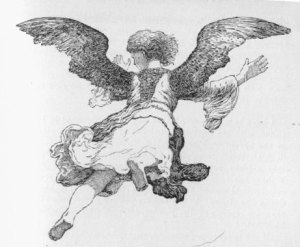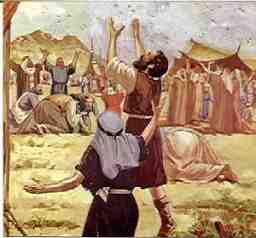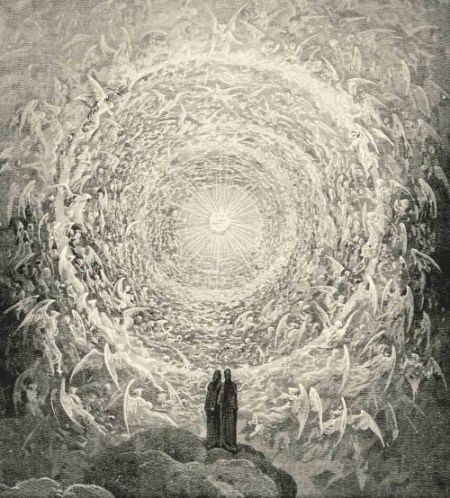By Fr. Chinnappan Pelavendran
(Luke 2:8) Now there were in the same country shepherds living out in the fields, keeping watch over their flock by night. These shepherds were watching Passover lambs, which would be sacrificed later that year. So it is appropriate that they are about to go look at another Passover Lamb who will also be sacrificed later in His life.
(Luke 2:9) And behold, an angel of the Lord stood before them, the glory of the Lord shone around them, and they were greatly afraid. (Luke 2:10-12) Then the angel said to them, “Do not be afraid, for behold, I bring you good tidings of great joy which will be to all people. For there is born to you this day in the city of David a Savior, who is Christ the Lord. And this will be the sign to you: You will find a Babe wrapped in swaddling clothes, lying in a manger.”
The angel tells the shepherds about the birth of Christ, that He will be the Savior of the world. “Glory to God in the highest, and on earth peace, goodwill toward men!” The angels proclaim Christ will bring peace. Peace does not come through money and power of the Emperor, but through humility and service. Moreover, the all-important peace with God comes only to those who believe in Jesus for eternal life. Only through Christ can you have true and lasting peace. That is the message the angels proclaim. You see, in Isaiah 48:22, God says that there is no peace for the wicked. We live in a wicked, sinful world. Those who live in wickedness and sin will never have peace. If, however, you are one of those who have come to know Jesus Christ as your Savior by believing in Him alone for eternal life, then you can know this peace the angels proclaim. Romans 5:1 states, “Therefore, being justified by faith, we have peace with God through our Lord Jesus Christ.”
Peace is available to you today if you are a person of God’s will. What is God’s will? To believe in Jesus Christ for eternal life. In John chapter 6, some people come to Jesus and ask him, “What must we do to do the works of God? What is His will?” Moreover, Jesus said, “This is the will of my Father, that you believe on Him whom the Father has sent.” (John 6:28-29) That is it. Believe in Jesus for eternal life. Do you want to have the peace the angels proclaim here? You need to be a man or a woman of God’s will; you need to do God’s will, which is to believe in Jesus for eternal life. However, if you reject Him, you also reject peace. There can be no peace in this world without Him.
(Luke 2:15-16) So it was when the angels had gone away from them into heaven that the shepherds said to one another, “Let us now go to Bethlehem and see this thing that has come to pass, which the Lord has made known to us.” And they came with haste and found Mary and Joseph, and the Babe lying in a manger.
It says they came with haste. This was the first Christmas rush, but certainly different from the Christmas rush we are familiar with. They were rushing to see Jesus. I wish we all were more like these shepherds. They heard the Word of God spoken here by angels, and they immediately acted upon it. They did not wait around until it was morning. They did not ask for better directions. They received by faith the message God sent to them and then responded with immediate obedience. I am sure they knew where all the stables were, so they just checked around until they found the one Mary, Joseph and Jesus were in.
We should also note that the angels did not appear to kings. They did not appear to the mayor of Bethlehem. They did not appear to the religious leaders in Bethlehem. They appeared to be shepherds. Just humble shepherds out in the field. Shepherds were outcasts in Israel. Mary’s song pointed out back in Luke 1:51-53 that this would be a pattern in the life of Christ, and it has already begun here. (1 Cor. 1:26-29) It seems that the poor and the people who are nobodies are often the ones whom God gives special attention to.
(Luke 2:17) Now when they had seen Him, they made widely known the saying which was told them concerning this Child. The shepherds became the first Christian evangelists. The first witnesses to spread the good news of the Messiah. When they saw Jesus Christ, they could not help but keep silent about Him. They told everyone they met. Again, they are a lesson for us. Not only did they obey God’s Word immediately, but they also went beyond that and told others about Jesus. Once you have seen Jesus, it is a privilege, it is an honor, it is a necessity to tell others about Him. Once you have seen Jesus, you can’t keep from talking about Him even if you tried. The shepherds were so excited about what they had seen and heard, they just had to tell everybody.
(Luke 2:18) And all those who heard it marveled at those things which were told them by the shepherds. This is a key idea after all that we have seen today. Things did not go as planned for Mary and Joseph. They had experienced more trouble than they should have. And rather than complain, rather than criticize, they quietly accepted what God was doing. Joseph could have blown his own horn and demanded he get what he deserved as a descendant of King David. But he didn’t. Mary could have gone around bragging that she was carrying the promised Messiah and as a result, she could have demanded that she be given the best room in the inn – for free, and the innkeeper should kick out whoever was there. But she didn’t.
Mary and Joseph chose to humbly accept the trials and troubles that God sent their way, and as a result, God lifted them up. He raised them up. He sent angels to blow the trumpet for them, and shepherds to pass the word for them about who they were, and what kind of child they had been blessed with. Mary and Joseph chose not to blow their own horn. Instead, they let God do it for them. When credit comes to you for the ministry and talents and abilities you have, let it be God and others who bring it rather than yourself.
(Luke 2:19-20) But Mary kept all these things and pondered them in her heart. Then the shepherds returned, glorifying and praising God for all the things that they had heard and seen, as it was told them. Mary was not the one to go around and tell people about how great she was, and how much God had blessed her. Instead, she just kept all these things and pondered them in her heart. God used the shepherds to tell the world about Mary and her newborn baby. Instead, like Mary and Joseph, quietly and humbly accept whatever position and privilege God has placed you in, and as you prove yourself faithful with a little, He will give you more. Don’t blow your own horn. Let God blow it for you in his perfect timing.
All of us need to learn from Mary and Joseph that our sufferings, our troubles, and our trials in life are tools in the hand of God to mold us shape us, and make us into something beyond our imagination. When trials and troubles come into your life, God is making you into something great. In whatever trials you are facing, ask God these kinds of questions: Say, “Father, what are you trying to teach me in this situation? How can this trial make me more like Jesus Christ?” God wants to change your troubles into trumpets if you will only let him perform His work in you.
God brought the first message of the birth of Jesus to ordinary people rather than to princes and kings. God spoke through His holy angel to the shepherds who were keeping sheep in the fields. This was a lowly occupation, so shepherds were not well educated. But Mary tells us the true story: “He has put down the mighty from their thrones; and exalted the lowly. He has filled the hungry with good things, and the rich He has sent away, empty.” (Luke 1:52–53)
What was the message of the angel to the shepherds? First, he told them not to be afraid. Repeatedly, the presence of angels was frightening to those to whom they came. However, unless they came in judgment, the angels spoke a word of reassurance. They calmed the people to whom they came.
“Behold, I bring you good tidings of great joy which will be to all people. For there is born to you this day in the city of David a Savior, who is Christ the Lord.” (Luke 2:10-11) The good tidings were that the Savior had come. The people needed somebody who could bring them back into fellowship with God because the blood sacrifices could not do this in any permanent way. The Lord had visited His people with salvation.
Another lesson we can learn from the shepherds at Jesus’ birth is that ordinary people can tell others about the Savior. Once the shepherds made it to Bethlehem and saw the Savior, “they spread the word concerning what had been told them this child. And all who heard it were amazed at what the shepherds said to them.” In their joy and praise, they could not refrain from telling others about their experience.
These ordinary shepherds, who were outcasts among their people, were the first to hear of Jesus’ birth and to spread that news. They did not wait until they had extensive theological training to tell others. Instead, they went out and told people about their experience of hearing the message of the angel and seeing the Savior. We can do the same.
Many of us will think that we need more effective in sharing the gospel once we have read a book or the Holy bible or taken a course on the bible. Books and courses are helpful resources, but all believers can tell others about how Jesus saved them. We do not have to wait until we feel qualified enough, because we can all testify about Christ’s saving work in our lives.
If the shepherds, who were outcasts in society, could spread the good news about Jesus’ birth, then we can certainly tell others about how Jesus saved us. The shepherds also remind us of the need to listen to the Lord and obey Him, that ordinary people can spread the good news of Jesus, and that worship should be our response to Jesus’ saving work.
















